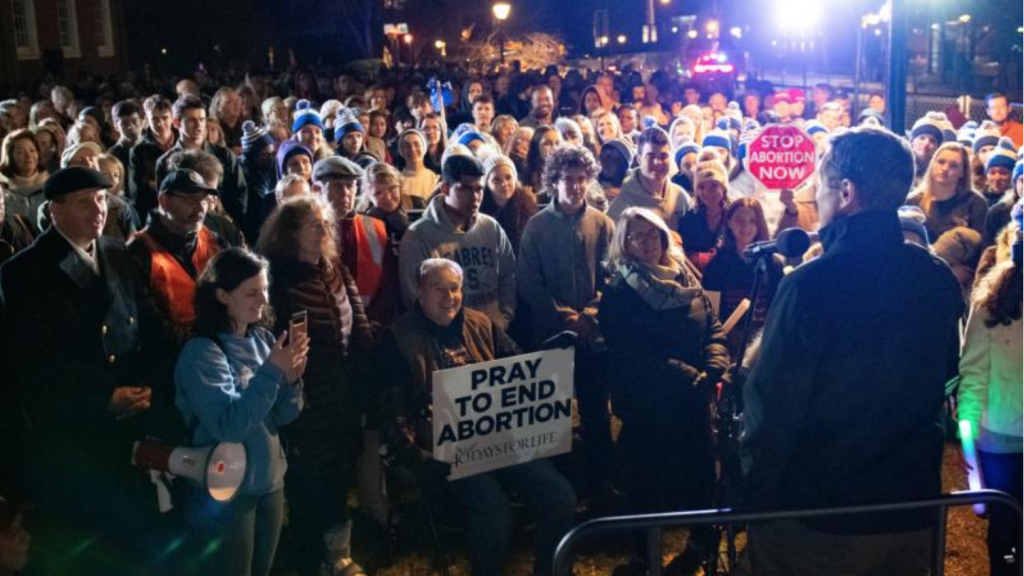Hundreds of people rallied through the streets of Annapolis Feb. 24 for the annual Maryland March for Life, urging more state-level restrictions on abortion and opposing a bill that would make doctor-assisted suicide legal in the state.
With signs reading "Voices for the vulnerable" and "Respect life: conception to natural death," the marchers held a vigil outside the Maryland Statehouse as speakers including state senators and delegates urged those in the crowd to make their voices heard with their elected representatives.
Many of the demonstrators were concerned about yet another effort to make doctor-assisted suicide legal that's making its way through the Maryland Senate and House of Delegates. Diana Pines, a 35-year-old stay-at-home mother from Bel Air, marched with a sign reading "Kill SB 701, Not vulnerable people."
"For years, they've been trying to pass bills that would allow physicians to prescribe suicide here in Maryland. And it is really scary," Pines said. "In states where it is legal, we see a lot of dangerous trends. It's really important that health care actually be health care, that physicians take care of people and fight for their lives and for the betterment of their lives, not ending them."
Pines said her advocacy was based in part on her personal experience -- a friend had been diagnosed with a terminal illness and chose a natural death over suicide.
"She lived a beautiful life for as long as she had it and she had a brain tumor and she was told she didn't have very much time to live," Pines said. "She lived for years after that and had a valuable, fulfilling life for many years before the end actually came."
Thomas Kolar, a religion teacher at Our Lady of Good Counsel in Olney, said he believes most Marylanders are unaware of the effort to legalize assisted suicide and has urged his students to get the word out.
Kolar, faculty adviser for the Students for Life, said the group has sent our postcards to their representatives, urging them to oppose the bill.
"If people knew about this, they wouldn't support it," he said.
This year's version of the bill will reflect changes made in 2019, adding more requirements for people who want to end their lives. For example, the revised bill raises the age from 18 to 21 and requires a mental health evaluation. In addition people must ask for the lethal prescription three times.
The Baltimore Sun daily newspaper reported that a leading advocacy group for assisted suicide, Compassion & Choices, dropped its support for the bill because of the changes.
Supporters of the bill say assisted suicide gives people who are living with crippling terminal illnesses a compassionate way to end their lives.
The first hearing on the Senate bill was scheduled for noon Feb. 28 in the Senate Judicial Proceedings Committee.
State Delegate Brian Chisholm, a Republican, said he opposes the bill even with the new requirements.
"I have deep concerns that it will only be used as a cost-savings mechanism in the health insurance industry. And that's already played out in some other countries. It concerns me here. It's also diminishing the value of life," said Chisholm, a parishioner of St. John the Evangelist in Severna Park.
Chisholm said while the makeup of the state Legislature has become more progressive this year, he believes lawmakers will be consumed with other priorities, including an education bill.
"I also don't know if this Senate has the will to try to get it through again because it was gut-wrenching even for a lot of Democrats last year," Chisholm told the Catholic Review, the news outlet of the Archdiocese of Baltimore.
Students from Mount De Sales Academy in Catonsville had a prominent role in the march, carrying a large banner as they led the procession through the streets of downtown Annapolis. St. John the Evangelist in Frederick and St. Joseph in Sykesville were among several Catholic parishes that took busloads of parishioners to the event.
Before the march, Auxiliary Bishop Joseph L. Coffey of the U.S. Archdiocese for Military Services celebrated a Mass at St. Mary's Church in Annapolis. Bishop Coffey, stepping in for Baltimore Archbishop William E. Lori, whose father died Feb. 24, drew on the historic church's connection to the founding fathers. A nondenominational worship service was also offered.
Bishop Coffey noted that Charles Carroll, one of the signers of the Declaration of Independence, was born on the property of St. Mary's and his descendants later gave the land to the church.
He quoted from the Declaration of Independence to drive home the themes of the march.
"We hold these truths to be self-evident, that all men are created equal," Bishop Coffey said. "They're endowed by their creator with certain unalienable rights, that among them are life, liberty and the pursuit of happiness."
He kept with the theme of history, reminding worshippers that the status quo isn't always what's right and moral.
"We know that slavery used to be legal. It's now illegal and it's unthinkable," Bishop Coffey said. "That's the way abortion has to not be only illegal, but unthinkable."

